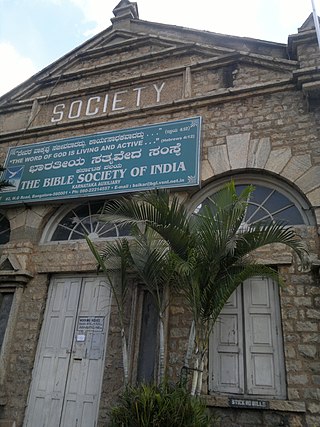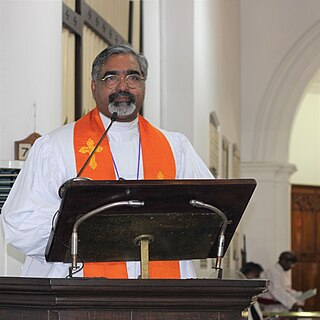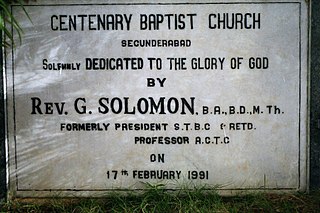Related Research Articles

Victor Premasagar (1927–2005) was the fourth successor of Frank Whittaker as Bishop in Medak. He was an Indian churchman and Old Testament scholar who made major contributions to research on the Old Testament and to the field of theology. Premasagar's articles appeared in the Expository Times (1966), the Vetus Testamentum (1966), the International Review of Mission (1972), and the Indian Journal of Theology (1974) and cited in major works relating to the theme of Promise in the Bible and critical works on Psalms LXXX and the Hebrew word HOQ in the Tanakh.

The Bible Society of India is a Christian body that is authorized to translate, produce, distribute and market the Bible and is a member of the United Bible Societies.
D. S. Satyaranjan was a Silver Jubilee Pastor, a New Testament Scholar, and an Administrator who served as the Registrar of the Senate of Serampore College (University), the nation's first University {a University under Section 2 (f) of the University Grants Commission Act, 1956} with degree-granting authority validated by a Danish Charter and ratified by the Government of West Bengal.
E. C. John was an Indian Old Testament scholar and a member of the Society for Biblical Studies in India. He was also a member of the George Bell Institute at the University of Chichester, Chichester and the Society for Old Testament Study, England.
Bishop T. B. D. Prakasa Rao was the fourth CSI-Bishop - in - Krishna-Godavari of the Protestant Church of South India who occupied the Cathedra placed at CSI-St. Paul's Cathedral, Vijayawada. The Bishopric of Prakasa Rao lasted for two decades from 1981 through 2001, one of the longest in the history of the Church of South India Society. Prakasa Rao led the bishopric of Krishna-Godavari that comprised the Christian missions established by the London Missionary Society (LMS) and the Church Missionary Society (CMS) which merged its South India Christian missions in India into the Church of South India Society which was inaugurated in 1947 at the CSI-St. George's Cathedral, Madras.
The Bible Society of India Andhra Pradesh Auxiliary is located in Guntur.
Ch. Victor Moses is President Emeritus of the Protestant Andhra Evangelical Lutheran Church Society headquartered in Guntur. Victor Moses is an Old Testament Scholar and a member of the Society for Biblical Studies, India, an august body of learning having members well versed in Hebrew and Greek languages hailing from the Protestant, Catholic, Orthodox and Pentecostal traditions.
L. Prakasam was a pastor of the Convention of Baptist Churches of Northern Circars who served as the auxiliary secretary of the Bible Society of India Andhra Pradesh Auxiliary during the period 1982–1998, the longest in the history of the auxiliary.
Bishop Emeritus John S. Sadananda was the Master of Serampore College (University), the nation's first University {a University under Section 2 (f) of the University Grants Commission Act, 1956}) with degree-granting authority validated by a Danish Charter and ratified by the Government of West Bengal.

Timotheas Hembrom was an ordained Minister of the Church of North India and an Old Testament Scholar who taught at the Bishop's College, Kolkata, affiliated to the nation's first University, the Senate of Serampore College (University). As a Biblical scholar, Hembrom was a member of the scholarly Society for Biblical Studies in India, with members from the Protestant, Orthodox, Catholic and Charismatic Church societies. He researched on Santali creation traditions and his work was first published in 1996 was simultaneously reviewed in the Indian Journal of Theology and the Journal of Hindu-Christian Studies.
D. I. Hans is a Religions Scholar who researched on Vijayanagara literature in Kannada, especially the Veerashaiva writings with special reference to Basavanna. Hans used Historical criticism to study Basavanna's ethical teachings. As a Veerashaiva Scholar, Hans also prepared a bibliography on the existing Veerashaiva literature available in some of the Languages of India, namely, Sanskrit, Hindi, Marathi, Urdu, Telugu and Tamil.
N. K. Achümi was a Bible Translator who was Translations Advisor with the United Bible Societies and was based in Nagaland.
Graham Sydney Ogden is an Old Testament scholar who served as Translations Consultant with the United Bible Societies. Ogden contributed to the scholarly journals through his research and his writings began appearing in The Bible Translator, Journal of Biblical Literature, Journal for the Study of the Old Testament, Vetus Testamentum and other journals.
John Philipose is a New Testament Scholar who served as the Director of Translations at the Bible Society of India, Bangalore during 1984-1991 succeeding M. P. John. Philipose was involved in various translations and revisions of the Bible into the many Indian languages and used to contribute to scholarly journals like The Bible Translator.
G. D. V. Prasad is an Old Testament scholar and translator who was the Director of Translations at the Bible Society of India, Bangalore, from 1991 to 2010. Prasad is from the Diocese of Krishna-Godavari of the Church of South India.
The Bible Society of India Telangana Auxiliary is located in Secunderabad which was bifurcated from the erstwhile Andhra Pradesh Auxiliary on 2 February 2016.

A. C. Solomon Raj is the seventh successor of Frank Whittaker and eighth Bishop in Medak of the Protestant Church of South India Society and shepherds the Diocese from the Cathedra of the Bishop housed in the CSI-Medak Cathedral in Medak Town, Telangana, India. On 12 October 2016, the Church of South India Synod headquartered in Chennai, appointed Solomon Raj to assume the ecclesiastical Office of the Bishopric of Medak and was consecrated the next day on 13 October 2016 at the CSI-St. George's Cathedral, Chennai, ending four years of sede vacante in the Diocese of Medak which was without a bishop during the intervening period of 2012–2016.
G. M. Butterworth is an Old Testament scholar who taught at the United Theological College, Bangalore from 1972 through 1978 and later on moved to TAFTEE in Bangalore and finally to England where he continued to bring out the message of the Old Testament.
Devadasan Nithya Premnath, known as D. N. Premnath, is an Indian pastor and Old Testament scholar, who has been teaching since 1988 at the St. Bernard's School of Theology and Ministry, a Roman Catholic seminary, in Rochester, New York. In 1981, Premnath participated in an archaeological dig at Tell el-Hesi in southern Israel.

G. Solomon was an Old Testament Scholar and a Baptist Patriarch hailing from the Protestant Samavesam of Telugu Baptist Churches Society (an affiliate member of the Baptist World Alliance and the National Council of Churches in India) and led it as its President during the years 1978-1982 overseeing the spiritual affairs of the Church Society whose ecclesiastical jurisdiction comprises the three states of Tamil Nadu, Andhra Pradesh and Telangana with 873 Churches comprising nearly a million members per present statistics.
References
- 1 2 Philip A. Noss, A History of Bible Translation, Amer Bible Society, 2007, p.242.
- ↑ Collected Essays, 1988. Journal of Biblical Literature 107 (3). The Society of Biblical Literature: 573–77.
- 1 2 3 4 5 Basil Rebera, The Bible Society of India and Inter-Confessional Translations, in D. S. Amalorpavadass (Edited), Report of the II All-India Biblical Meeting, NBCLC, Bangalore, 1975, p.348.
- ↑ Kristin Moen Saxegaard in Character Complexity in the Book of Ruth, Mohr Siebeck, Tubingen, 2010, p.168.
- ↑ Robert B. Chisholm in Interpreting the Historical Books: An Exegetical Handbook, Kregel, Grand Rapids, 2006, p.154.
- ↑ Joy Sisley, Power and Interpretive Authority in Multimedia Translation in Paul A. Soukup, Robert Hodgson (Edited), Fidelity and Translation: Communicating the Bible in New Media, Sheed and Ward/ABS, Wisconsin/New York, 1999, p.206.
- 1 2 K. M. Hiwale (Compiled), Directory of the United Theological College 1910-1997, Bangalore, 1997. Past students of the college diploma course, p.40; Postgraduate course, p.108.
- ↑ Murli Manohar Joshi, Higher Education in India Vision and Action, A paper presented at the UNESCO World Conference on Higher Education in the Twenty First Century, Paris, 5–9 October 1998. Internet, accessed 22 August 2008. Archived 23 February 2012 at the Wayback Machine
- ↑ United Theological College Magazine, Volume XXXVI, 1969-1970 available at the Archives in the library of Karnataka Theological College, Mangalore.
- 1 2 Basil A. Rebera, The meaning of mispat and sedeq/sedaqah in the pre-exilic prophetic literature and their translation in the Sinhalese Bible in Thesis Titles, Board of Theological Education of the Senate of Serampore College, Bangalore, 1991.
- ↑ Nitoy Achümi, Translation of 'God' and 'Lord' in Some Naga Bibles., The Bible Translator , 43/4 (1992):439-443.
- ↑ H. S. Wilson (Edited), The Church on the Move, Essays in honour of Victor Premasagar, Christian Literature Society, Madras, 1988, p.vi.
- ↑ E. C. John, Divine Manifestations, Bangalore Theological Forum, III/2, Bengaluru, July 1971. p.19. Cited by G. Babu Rao in Wisdom Tradition and the Indian Parallels with special reference to Telugu literature, Andhra Christian Theological College, Hyderabad, 1990. Archived 7 October 2009 at the Wayback Machine
- ↑ Talathoti Punnaiah, My Memoir, Ministry and Message: (60 years Life Experiences 1950-2010), Kakinada, 2010, pp.85-86.
- ↑ The National Christian Council Review, Volume 84, Wesley Press and Publishing House, 1964, p.135.
- 1 2 3 4 5 6 7 8 Paul A. Soukup, Robert Hodgson (Edited), Fidelity and Translation: Communicating the Bible in New Media, Sheed and Ward/ABS, Wisconsin/New York, 1999, p.286.
- ↑ Basil A. Rebera, The Book of Ruth: Dialogue and Narrative, the Function and Integration of the Two Modes in an Ancient Hebrew Story, Macquarie University, Sydney, 1981.
- ↑ Perspective, Volume 21, Issue 97, Winter 2015, p.5
- 1 2 Graham S. Ogden and Basil Rebera, Rev. Euan McG. Fry, The Bible Translator , Volume 55, Number 4, October 2004.
- ↑ Basil A. Rebera, Identifying participants in Old Testament dialogue, Bible Translator 33.2 (April 1982): 201-207.
- ↑ Basil A. Rebera, Book titles (2): the prophetic books, Bible Translator, 34.2 (April 1983): 231-235.
- ↑ Basil A. Rebera, Yahweh or Boaz: Ruth 2:20 reconsidered, Bible Translator, 36.3 (July 1985): 317-327.
- ↑ Basil A. Rebera, Translating Ruth 3:16, Bible Translator, 38.2 (April 1987): 234-237.
- ↑ Basil A. Rebera, He got up’--or did he: (1 Samuel 20:25), Bible Translator, 40.2 (April 1989): 212-218.
- ↑ Basil A. Rebera, Lexical cohesion in Ruth : a sample in Perspectives on Language and Text; Essays and Poems in Honor of Francis I. Andersen. Ed. by Edgar W. Conrad and Edward G. Newing, Eisenbrauns, Winona Lake, 1987.
- ↑ Basil A. Rebera, Current Trends in Scripture Translation, United Bible Societies, 1994.